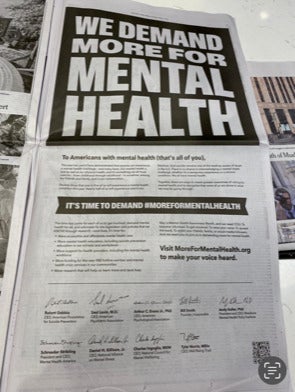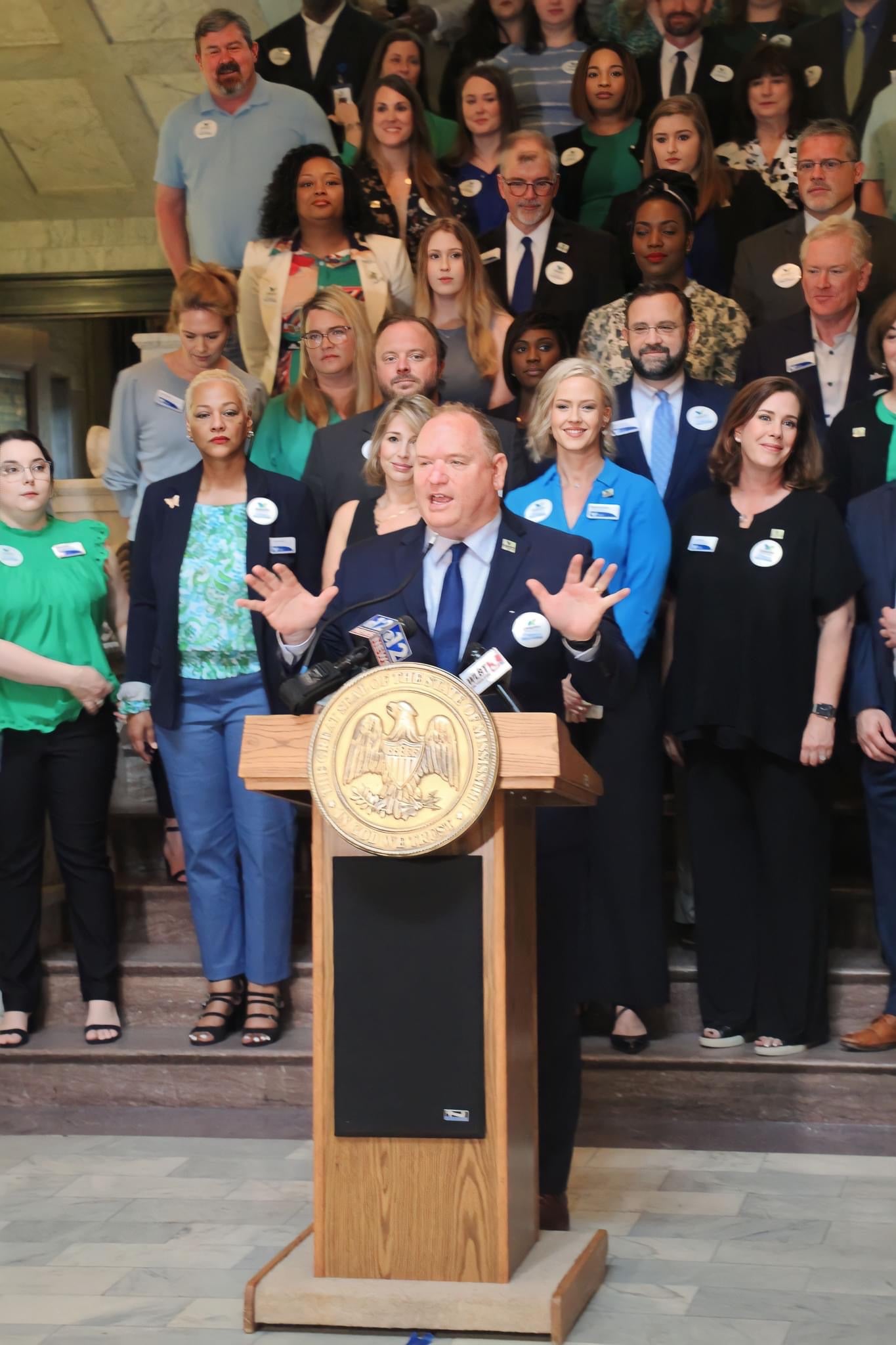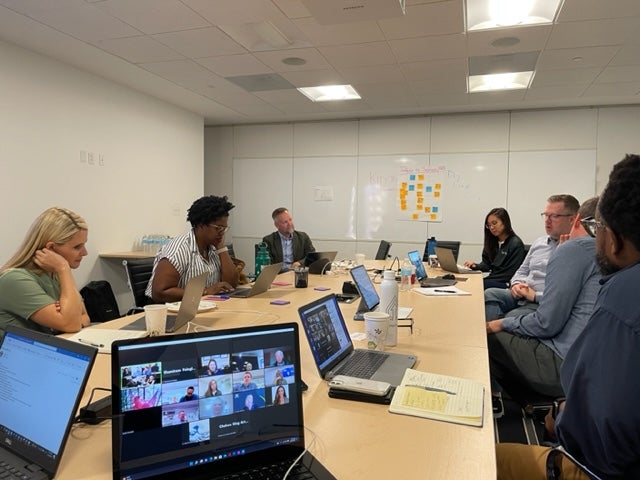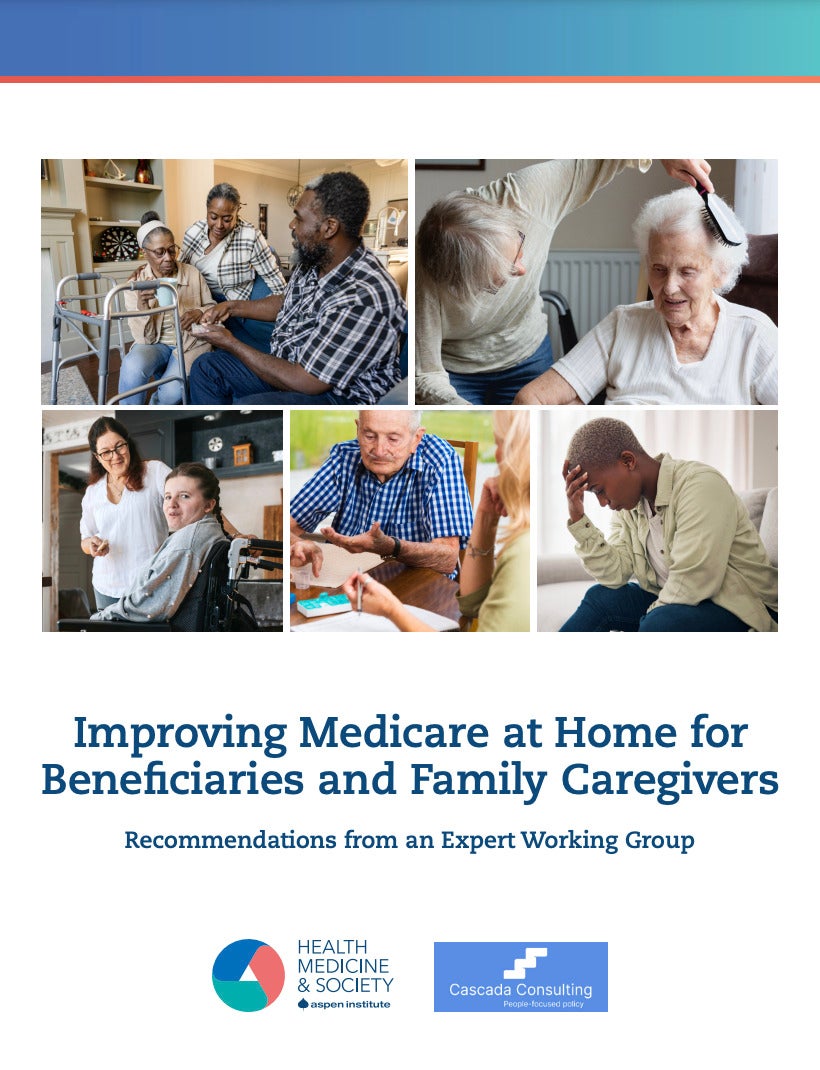11 Questions with John Damon, Health Innovators Fellow and Co-Founder of “Megaventure” Canopy Anywhere
John Damon, CEO of Canopy Children’s Solutions and a Fellow in the Aspen Institute’s Health Innovators Fellowship, has dedicated his life to serving children experiencing mental health distress. As part of the Fellowship, each Fellow undertakes a social impact venture to address a major health care challenge.
With an upswell of urgency surrounding poor youth mental health across the United States, John’s solo venture focused on this issue transformed into a mega-collaboration with other Health Innovators Fellows. Together, they created Canopy Anywhere, a groundbreaking tech-enabled mental health care platform built to systematically address the root causes of the mental health crisis. Their innovative approach aims to provide children with the most crucial element of wellbeing: hope.
In this Q&A, John discusses his leadership values, the model behind Canopy Anywhere, and the significant role played by collaboration among the Health Innovators Fellows in the development of this platform.
Answers have been edited for length and clarity.
1. Why did you decide to focus your career and your Fellowship venture on youth mental health?
I grew up outside Jackson, Mississippi, and had what some might say was a “utopian” upbringing until about the age of 10. At that time, my family faced challenges due to alcoholism, leading to the collapse of our business and my parent’s marriage. My father moved out of state and my mom, who had never worked a day in her life, went back to school. There was an evening when my sister and I were being watched by a babysitter and while playing hide and seek, a lampshade tilted over. Later that night, the lampshade caught fire and our whole house burned down.
In this dark moment, there was one person who came into my life and made all the difference. In that one encounter, I just remember thinking, even as a kid, “I want to be that person for someone else.” So, why this career? Why focus on kids? Because someone was there for me when I needed it.
2. How did the collaboration between you and your Health Innovators Fellowship classmates begin?

This full page ad in the New York Times ignited a conversation around how Health Innovators Fellows should seize this moment and work to address the mental health crisis together.
During our fourth Fellowship seminar, a full-page ad in the New York Times came out demanding more for mental health. It had all the right signatories: American Psychological Association, American Psychiatric Association, etc. While exciting, our class WhatsApp group lit up with people questioning whether there was a public policy or business plan behind it.
This reminded me of the quote by Eminem: “We’ve got one shot, one opportunity.” The Fellowship is made up of some of the brightest minds in health care and we needed to take action. Suddenly, everyone joined in, and after many conversations, we found a focus on youth mental health. My venture became a collective effort as Aspen Fellows united to create something special together that we could never accomplish apart.
3. What do you see as the root causes of the Youth Mental Health Crisis?
Four things: 1. Stigma: Mental health importance is still a barrier despite progress made during the pandemic; 2. Educational barrier: Lack of knowledge about mental health signs, symptoms, and navigating a complex ecosystem; 3. Lack of integration: Mental health needs to be integrated into healthcare and education. Currently, these areas are siloed; 4. And escalating costs.
This crisis is also happening in a broader social context where kids, for the first time, despite being the most connected generation in history, are more isolated and lonely than any other time that we know of. Before the pandemic, hopelessness scores and sadness scores were up 40%. Suicide rates were up 57%. And then with the weight of the pandemic, those stress fractures all became compound fractures in kids’ lives.

John Damon at the Mississippi State Capital announcing Canopy Anywhere’s launch with partners in Madison County Schools, Delbert Hosemann, the Commissioner for the Department of Mental Health, Lt. Governor, and Phillip Gunn, Speaker of the House.
4. How does Canopy Anywhere address those challenges?
Canopy Anywhere systematically addresses each of the barriers I mentioned.
Take the social stigma of mental health: We’re not framing Canopy Anywhere as a mental health intervention because some people pull back as soon as they hear those words. Instead, we’re going into the schools and discussing ways to elevate hope for every child, promoting a wellness mindset that drives change.
To solve the education challenge, we’re creating a digital platform that encompasses the complex and fragmented healthcare and mental healthcare ecosystem. We curate services that simplify the process, offering a comprehensive portfolio ranging from self-guided digital programming to crisis resources.
The third aspect is breaking down the barriers between education and healthcare. Currently, some educators are leaving the profession because they initially chose to be educators, not frontline mental health first aid providers. Similarly, ER doctors, for example, are overwhelmed with mental health crises. Our goal is to free up educators to focus on teaching and healthcare providers to focus on providing care. Canopy Anywhere serves as a resource and engagement platform, enabling immediate connections between students or patients and the necessary support, allowing professionals to concentrate on their respective roles.
The fourth barrier is addressing the escalating costs of mental health care. We are facing a workforce crisis in mental health. While we cannot instantly increase the size of the mental health workforce, we can expand the care force. By empowering children with various resources that foster hope, we alleviate some pressure on the system and reserve scarce resources for individuals with genuine mental healthcare needs. Ultimately, this approach is more cost-effective for families.
5. Your fellow Fellows called on you to deploy this solution in Mississippi first. Why start there?
We’ve got the mantra, “If you can do it Mississippi, we can do it anywhere.” Mississippi ranks 50th in many aspects, such as poverty measures and health measures. I feel a responsibility to change the game here. I also think this is the one place we can do it because relationships are so deep here. I’ve got long lasting, trusting relationships with key decision makers and stakeholders and policymakers that could allow us to get some really big incredible things done that maybe you wouldn’t be able to do in a larger state.
6. While building Canopy Anywhere, what have you learned about what makes for good collaboration?

Canopy Anywhere collaborators gathered in Washington DC for a two-day summit where they worked alongside other Fellows, community leaders, and family advocates to center on youth voice and inform their work.
If you want strong collaboration, find people you genuinely trust. Discover shared values that reflect your deep beliefs, and then hold high expectations for one another. Believe in something greater through mutual understanding.
One of the really cool things about the Health Innovators Fellowship is that it develops deep, implicit, vulnerability-based trust. Fellows have such a great advantage because you have a shared experience and you can lean into that vulnerability in how you show up.
We brought together three companies, each led by Fellows, to establish Canopy Anywhere. We hold weekly calls and have conducted offsite meetings, consistently bringing our best selves, and our people, to the table without ego. Within a foundation of trust, we’ve found alignment and established a social contract based on reciprocity and accountability. We’re running great financial models about how this scales, but no one has exchanged a dollar in the two years we’ve been working together. We know we’re doing this because of the unprecedented mental health moment happening right now. We know we have a stewardship responsibility to get this right.
7. How do values drive your leadership and decision making?
When things get really tough, your values are what root you down. So, organizationally and personally, going back to our values is how we decide everything that we do. We’re also intentional in feeding those values with smart and healthy behavior so that everything thrives.
8. How do you personally make time to reset and refresh while doing this work?
I am such a work in progress, in that, I’m much better at preaching it than I am practicing it. However, I have surrounded myself with exceptional individuals who are granted full permission to provide honest feedback in my life. It is truly a gift. They are guiding me to prioritize self-care. With the assistance of one of our moderators, John Simpkins, I had intended to take the entire month of March off this year. Unfortunately, due to various circumstances personally and to do with work, I was able to take some time, but not the whole month. I am making progress, but I’ve got a long way to go.
I draw immense inspiration from the Harvard Business Review article titled Making of a Corporate Athlete. I’ve tried to implement micro-rests between high exertion moments. This looks like taking walks, leaving some 5-10 minutes between meetings just to take a second to reflect and think.
9. How can leaders create a supportive and empathetic environment for individuals facing mental health struggles?
Be your authentic self. I think it’s important for the leader to live congruently. It’s not just “them” struggling – it’s you too. I’m pretty transparent with my team about my struggles. We have a high degree of trust and there’s always professional boundaries – I’m not saying you have to lose those – but your team knows if you’re struggling. So, you’re better off just owning it and asking for help when you need it.
You set the tone as the leader. The impact of your behavior will have a ripple effect, influencing how your team members treat their own teams, who, in turn, treat their respective teams. I hope people listen not solely due to positional authority, but because of moral authority, driven by genuine, authentic nature.
Dr. John Damon, MS, PhD, is the CEO for Canopy Children’s Solutions, Mississippi’s largest and most comprehensive non-profit provider of children’s behavioral health, education, and social services. John is a Fellow of the fifth class of the Health Innovators Fellowship and a member of the Aspen Global Leadership Network.
Canopy Anywhere was founded by Health Innovators Fellows John Damon, Michael O’Neil, Founder and CEO, Get Well Network, and Dale Cook, Co-founder and CEO, Learn to Live. In addition, Health Innovators Fellows across classes serve on a steering committee for the organization to help shape its vision.
The Health Innovators Fellowship’s mission is to develop a community of energized, values-driven leaders committed to finding viable solutions to address U.S. health care’s problems. The Fellowship offers high-performing professionals a unique experience—the ability to connect with and learn from a diverse group of peers with whom they wouldn’t ordinarily interact while refining their own values and charting a course that empowers them to take action in new ways to improve health and health care in America.
Photos are courtesy of John Damon.

